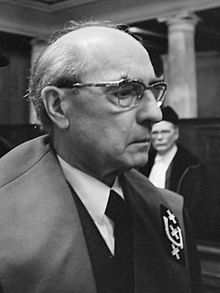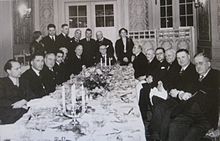Arthur Lehning
Paul Arthur Müller-Lehning (also Arthur Müller Lehning or Arthur Müller-Lehning) (born October 23, 1899 in Utrecht , † January 1, 2000 in Lys-Saint-Georges , France ), son of German parents, was a Dutch author , activist , Co-founder of the International Institute for Social History (IISG) and anarchist .
Life
Paul AM Lehning attended elementary classes from the Evangelische Broedergemeente (Evangelical Brother Congregation ) in Zeist . Here he met the poet Hendrik Marsman with whom he was friends until 1926. At that time Lehning was a supporter of individual freedom, while for Marsmann this view "heralded the end of human civilization ". Their ways parted. Lehning later dedicated a book to him with the title De vriend van mijn jeugd (“The friend from my youth”). In 1919 Lehning studied economics in Rotterdam and in 1922 history in Berlin. In Berlin he met the German anarcho-syndicalist Rudolf Rocker , Alexander Berkman and Emma Goldman . He was friends with Berkman, Goldman and Clara Gertrud Wichmann . His attitude to anti-militarism brought him into contact with Lambertus Johannes Bot and Bart de Ligt . In Paris he discovered the modern painting of the Cubists, Expressionists and Futurists.
From 1927 to 1929 he published the magazine i10 in Amsterdam , for which he wrote many intellectuals and artists such as Le Corbusier , Walter Gropius , Wassily Kandinsky , Piet Mondrian , Upton Sinclair , Walter Benjamin , Ernst Bloch , Max Nettlau , Otto Rühle , Henriette Roland Holst , Alexander Berkman , Alexander Schapiro and others as contributors. This avant-garde magazine, in four languages: Dutch, German, French and English, was intended to reflect the new revolutionary movements in art and politics. In 1927 and 1929 he attended the congresses of the League against Imperialism and for National Independence . He worked as a correspondent for the International Anti-Militarist Bureau , founded in The Hague in 1921 to combat war and militarism. Lehning's journalistic activity between the two world wars was the analysis of the (again) threatening danger of war. He worked out " the anarchist tradition of the general strike as a reaction to the outbreak of war, as the 1st International Workers' Association had already called for in a resolution of the Brussels Congress of 1868 ".
With Augustin Souchy , Alexander Schapiro and Rudolf Rocker , Lehning was a member of the International Workers' Association from 1932 to 1935 and secretary of the IAA from 1933 to 1936. Together with Albert de Jong , Helmut Rüdiger and Augustin Souchy, he edited the press service of the International Antimilitarist Commission (IAK). After 1936, after his activities in the anarcho-syndicalist movement, he was mainly active as a historian who campaigned for the realization of a libertarian society by means of civil disobedience.
In October 1936 he went to Catalonia in the Spanish Civil War to fight on the side of the Republicans . After the Catalan anarchists were initially ousted by the communists and later militarily defeated by the Franquists, Lehning saw anarchism primarily as a political-critical theory in his later life.
In 1935 he co-founded the International Institute for Social History (IISG) in Amsterdam, in 1940 he saved the institute's archive material by taking it with him to England. In Oxford it was director of the English IISG from 1939 to 1947. In 1947 he had received British citizenship. At the invitation of the Indonesian government, Lehning founded a library for political and social sciences in Jakarta in 1952 .
From 1961 to 1981, Lehning published the Archives Bakounine on behalf of the IISG , a seven-volume collection of the most important works of Bakunin arranged by subject in the respective original language, a French translation and a supplementary annotation apparatus.
Arthur Lehning worked as a speaker well into old age. At the invitation of the Libertarian Forum and the International of War Resisters , he traveled to Berlin in 1986 and spoke about libertarian antimilitarism at Mehringhof . In 1987 he was involved in the special issue of the magazine Graswurzelrevolution on the subject of "Social History of Antimilitarism". In this special issue - with the collaboration of Gernot Jochheim - it was emphasized that “most of the texts, the political actions and thoughts of the anti-militarist movement from the first half” of the 20th century “are still very topical today, even today they are still a guideline can be in our political action ”( Grassroots Revolution 1987, editorial). A. Lehning himself made a biographical connection by stating that the content of the magazine Graswurzelrevolution today is a continuation of his anti-militarist work.
Awards
- 1963: Special award from the Jan Campert Foundation
- 1976: Honorary doctorate from the University of Amsterdam
- 1992: Gouden Ganzenveer for his special contribution to Dutch cultural work
- 1999: PC Hooftprijs for his complete works
Historical works
- Arthur Müller Lehning: The Social Democracy and the War. Revolutionary anti-militarism in the labor movement. The syndicalist, Fritz Kater, Berlin 1924.
- Arthur Müller-Lehning: The IAA and the fight against militarism and war.
- From Buonarrotti to Bakunin . Studies in international socialism. (From Buonarrotti to Bakunin. Study of international socialism.) 1970.
- Michael Bakunin. Over anarchism, state en dictatuur. (Michael Bakunin. On anarchism, state and dictatorship.) Compiled and provided with an introduction by Arthur Lehning (originally published by Boucher in the series Manifesten. 1970). New edition: Kritiese Bibliotheek / Van Gennep, 1976, ISBN 90-6012-325-5 .
- Conversations with Bakunin , collected by Arthur Lehning. Translated from the original languages by Rolf Binner and Gerd Müller, Nördlingen: Greno 1987, ISBN 978-3-89190-228-8 , Die Andere Bibliothek series .
Diaries
- Spaans dagboek, aantekeningen over de revolutie in Spanje. (Spanish diary, notes on the revolution in Spain.) 1996.
- Spanish Diary & Notes on the Revolution in Spain. With an introduction and remarks by Toke van Helmond-Lehning. Edition Tranvía, Frey, Berlin 2007, ISBN 978-3-938944-04-2 .
Translations into Dutch
- Arthur Lehning (ed. And translator): Michael Bakunin: Het verzameld werk. (Michael Bakunin: Collected Works. 7 volumes.) Archives Bakounine, 1961–…
Essays
- Politiek en cultuur. (Politics and Culture.) 1930.
- De draad van Ariadne - Essays en commentaren. (Ariadne's Wire - Essays and Notes.) 1966.
- Ithaka - Essays en commentaren 2 , (Ithaca - Essays and Notes 2.) 1980, ISBN 90-293-9725-X .
- Prometheus en het right van de opstand. (Prometheus and the Right to Insurrection.) 1987.
- De daughter naar Ithaka - Beschouwingen over politiek en cultuur. (The trip to Ithaca - reflections on politics and culture. Blossom harvest by Toke van Helmond.) 1999, ISBN 90-290-6581-8 .
literature
- Andreas Diers, Rudolf Steffens: Arthur Lehning . In: Günter Benser , Dagmar Goldbeck, Anja Kruke (eds.): Preserve, spread, enlighten. Archivists, librarians and collectors of the sources of the German-speaking labor movement. Supplement . Bonn 2017, ISBN 978-3-95861-591-5 , pp. 80-89. Online (PDF, 2.7 MB)
Individual evidence
- ↑ Quoting from Raymond van den Boogaard ( Memento of May 29, 2006 in the Internet Archive ) Published in NCR-Handelsblad of January 3, 2000. Online article on the Zeeburgnieuws website (Archive 2000); Dutch. Retrieved March 18, 2009
- ↑ Extensive bibliography, curriculum vitae and Lehning's friendship with R. Rocker, A. Berkman u. a. ; Dutch. Retrieved March 18, 200
- ↑ About Lehning's publication of i10 and his relationships with modern painters; Dutch. Retrieved March 18, 2009
- ↑ Quote from Johannes Hilmer; in the journal Schwarzer Faden , No. 69, March 1999
- ↑ See also: "Arthur Müller Lehning - Industrial Refusal of Service!" . Retrieved August 11, 2012
- ↑ See Wolfgang Eckhardt: Michael A. Bakunin (1814–1876), bibliography of primary and secondary literature in German. Libertad Verlag Berlin / Cologne 1994, p. 7f
- ↑ See editorial. In: "Grassroots Revolution" - for a nonviolent, domineering society. No. 117/118, 1987. Special issue on the social history of antimilitarism. No woman, no man, not a penny for the state and war. Also: Wolfram Beyer : What actually is anti-militarism. ( online )
Web links
- Literature by and about Arthur Lehning in the catalog of the German National Library
- Johannes Hilmer: Arthur Lehning on his 100th birthday, biography , 1999
| personal data | |
|---|---|
| SURNAME | Lehning, Arthur |
| ALTERNATIVE NAMES | Müller-Lehning, Paul Arthur (full name) |
| BRIEF DESCRIPTION | Dutch anarchist |
| DATE OF BIRTH | October 23, 1899 |
| PLACE OF BIRTH | Utrecht |
| DATE OF DEATH | January 1, 2000 |
| Place of death | Lys-Saint-Georges |

